Unit 1 Will people have robots 2
初二unit1Unit 1 Will people have robots
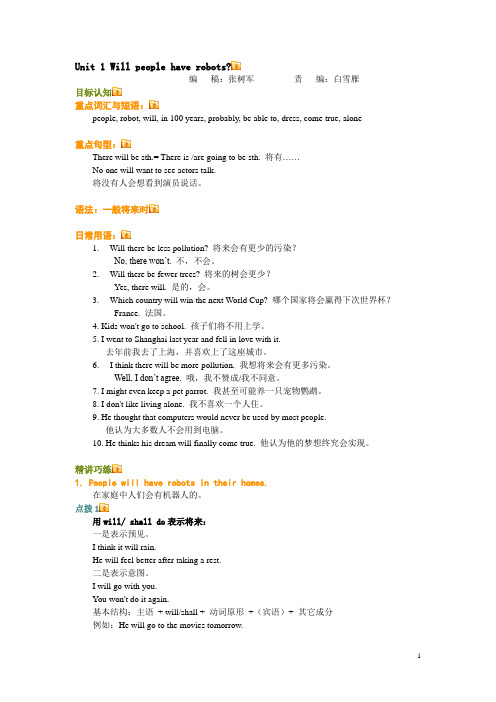
Unit 1 Will people have robots?编稿:张树军责编:白雪雁目标认知重点词汇与短语:people, robot, will, in 100 years, probably, be able to, dress, come true, alone重点句型:There will be sth.= There is /are going to be sth. 将有……No one will want to see actors talk.将没有人会想看到演员说话。
语法:一般将来时日常用语:1. ---Will there be less pollution? 将来会有更少的污染?---No, there won’t. 不,不会。
2. ---Will there be fewer trees? 将来的树会更少?---Yes, there will. 是的,会。
3. ---Which country will win the next World Cup? 哪个国家将会赢得下次世界杯?---France. 法国。
4. Kids won't go to school. 孩子们将不用上学。
5. I went to Shanghai last year and fell in love with it.去年前我去了上海,并喜欢上了这座城市。
6. ---I think there will be more pollution. 我想将来会有更多污染。
---Well, I don’t agree. 哦,我不赞成/我不同意。
7. I might even keep a pet parrot. 我甚至可能养一只宠物鹦鹉。
8. I don't like living alone. 我不喜欢一个人住。
9. He thought that computers would never be used by most people.他认为大多数人不会用到电脑。
新目标英语八年级下册Unit1Willpeoplehaverobots知识点
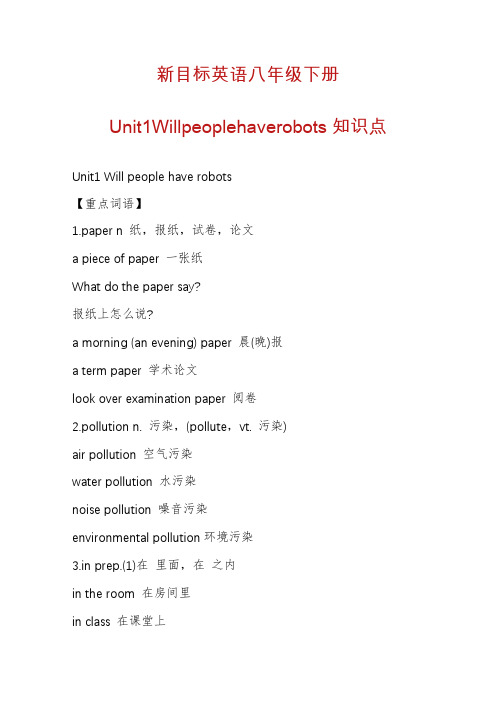
新目标英语八年级下册Unit1Willpeoplehaverobots知识点Unit1 Will people have robots【重点词语】1.paper n 纸,报纸,试卷,论文a piece of paper 一张纸What do the paper say?报纸上怎么说?a morning (an evening) paper 晨(晚)报a term paper 学术论文look over examination paper 阅卷2.pollution n. 污染,(pollute,vt. 污染)air pollution 空气污染water pollution 水污染noise pollution 噪音污染environmental pollution环境污染3.in prep.(1)在里面,在之内in the room 在房间里in class 在课堂上(2)在(某段时间)之间in the morning 在早上in the past 在过去I′ll come back in a day or two我过一两天就会回来in,after,later 接时间段,都可表示“(一段时间)之后”,它们有什么区别呢?①“in+一段时间”指“(将来的)一段时间之后”。
What will you be in five years?五年之后你干什么?We’ll start off in ten minutes.我们十分钟后出发。
②“after+一段时间”或“一段时间+later”表示“(在过去某个时间看来)一段时间之后”。
He went home after two days.他两天后回家了。
Three years later,she had a baby.三年后,她生了一个婴儿。
4.less adj. 较少的;少量的(little的比较级)They buy less beer and fewer cigarettes now现在他们买的啤酒和香烟比以前少了。
新目标英语八年级下册Unit 1 Will people have robots单词表整理
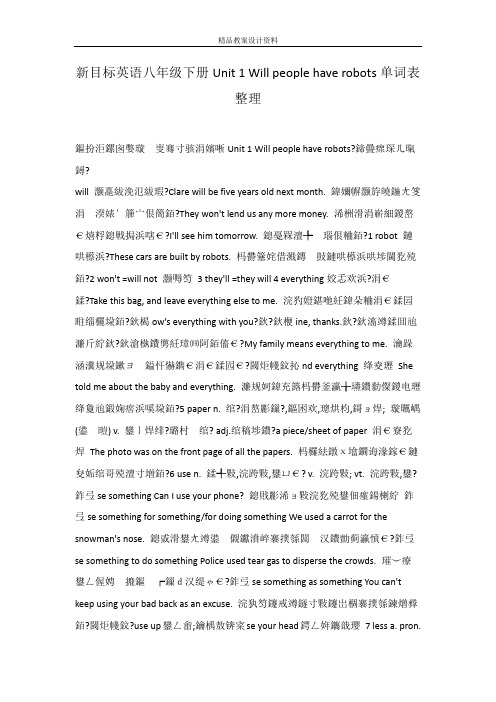
新目标英语八年级下册Unit 1 Will people have robots单词表整理鏂扮洰鏍囪嫳璇叓骞寸骇涓嬪唽Unit 1 Will people have robots?鍗曡瘝琛ㄦ暣鐞?will 灏嗭紱浼氾紱瑕?Clare will be five years old next month. 鍏嬭幈灏斿皢鍦ㄤ笅涓湀婊′簲宀佷簡銆?They won't lend us any more money. 浠栦滑涓嶄細鍐嶅€熺粰鎴戦挶浜嗐€?I'll see him tomorrow. 鎴戞槑澶╄瑙佷粬銆?1 robot 鏈哄櫒浜?These cars are built by robots. 杩欎簺姹借溅鏄敱鏈哄櫒浜哄埗閫犵殑銆?2 won't =will not 灏嗕笉 3 they'll =they will 4 everything姣忎欢浜?涓€鍒?Take this bag, and leave everything else to me. 浣犳嬁鍖咃紝鍏朵粬涓€鍒囩暀缁欐垜銆?鈥楬ow's everything with you?鈥?鈥楩ine, thanks.鈥?鈥滀竴鍒囬兘濂斤紵鈥?鈥滄槸鐨勶紝璋㈣阿銆傗€?My family means everything to me. 瀹跺涵瀵规垜鏉ヨ鎰忓懗鐫€涓€鍒囥€?閾炬帴鈫抋nd everything 绛夌瓑She told me about the baby and everything. 濂规妸鍏充簬杩欎釜瀛╁瓙鐨勬儏鍐电瓑绛夐兘鍛婅瘔浜嗘垜銆?5 paper n. 绾?涓嶅彲鏁?,鏂囦欢,璁烘枃,鎶ョ焊; 璇曞嵎(鍙暟) v. 鐢ㄧ焊绯?璐村绾? adj.绾稿埗鐨?a piece/sheet of paper 涓€寮犵焊The photo was on the front page of all the papers. 杩欏紶鐓х墖鐧诲湪鎵€鏈夋姤绾哥殑澶寸増銆?6 use n. 鍒╃敤,浣跨敤,鐢ㄩ€? v. 浣跨敤; vt. 浣跨敤,鐢?鈼弖se something Can I use your phone? 鎴戝彲浠ョ敤浣犵殑鐢佃瘽鍚楋紵鈼弖se something for something/for doing something We used a carrot for the snowman's nose. 鎴戜滑鐢ㄤ竴鍙儭钀濆崪褰撲綔闆汉鐨勯蓟瀛愩€?鈼弖se something to do something Police used tear gas to disperse the crowds. 璀﹀療鐢ㄥ偓娉摝鏂┍鏁d汉缇ゃ€?鈼弖se something as something You can't keep using your bad back as an excuse. 浣犱笉鑳戒竴鐩寸敤鑳岀棝褰撲綔鍊熷彛銆?閾炬帴鈫?use up鐢ㄥ畬;鑰楀敖锛寀se your head鍔ㄥ姩鑴戠瓔7 less a. pron.adv. 鏇村皯鐨?鏇村皬鐨? 鏇村皯鍦?鏇村皬鍦?Exercise more and eat less. 灏戝悆澶氳繍鍔ㄣ€?Getting out of bed in summer is less difficult than in winter. 澶忓ぉ璧峰簥姣斿啲澶╁鏄撶偣銆?閾炬帴鈫掆棌less and less 瓒婃潵瓒婂皬銆斿皯銆曞湴He's less and less able to look after himself. 浠栬秺鏉ヨ秺涓嶈兘鐓ч【鑷繁浜嗐€?鈼弆ess than ... 涓嶅埌锛屽皯浜?The young man is less than twenty years old. 杩欎釜骞磋交浜轰笉鍒?20 宀併€?鈼弉o less than 鎰忎负鈥滀笉灏戜簬锛涗笉涓嬩簬鈥︹€︿箣澶氾紱澶氳揪鈥︹€濄€備緥濡傦細In that battle, we wiped out no less than twenty thousand enemies. 鍦ㄩ偅涓€娆℃垬褰逛腑锛屾垜浠秷鐏殑鏁屼汉涓嶄笅20,000 浜恒€?鈼弉ot less than 鎰忎负鈥滀笉灏戜簬鈥濓紝鍚?at (the) least銆?Our school has not less than three thousand students. 鎴戜滑瀛︽牎鎷ユ湁鐨勫鐢熶笉涓?3,000 浜恒€?8 fewer a. 灏戠殑; int. 杈冨皯鏁? a. 杈冨皯鐨?There seem to be fewer tourists around this year. 浠婂勾娓稿浼间箮灏戜簡銆?閾炬帴鈫抐ewer+鍙暟鍚嶈瘝锛屽锛歠ewer books銆?less+涓嶅彲鏁板悕璇嶏紝濡傦細less water銆?9 pollution n. 姹℃煋air/water pollution 绌烘皵銆佹按姹℃煋environmental pollution 鐜姹℃煋noise pollution鍣煶姹℃煋10 tree 鏍?We sat under a tree for shade. 鎴戜滑鍧愬湪鏍戜笅涔樺噳銆?11 she'll=she will 12 building寤虹瓚鐗?tall/old/historic buildings 楂樺ぇ銆佸彜鑰併€佸巻鍙插缓绛?the building of the school 瀛︽牎鐨勫缓绛?the building trade寤虹瓚涓?13 astronaut 瀹囪埅鍛?14 rocket n. 鐏,鐑熺伀; v. 鍙戝皠鐏,鐚涙定They launched a rocket to the planet Venus. 浠栦滑鍚戦噾鏄熷彂灏勪簡涓€棰楃伀绠€?15 space n. 浣嶇疆,绌洪棿,璺濈; v. 闅斿紑,鍒嗛殧Is there any space for my clothes in that cupboard? 琛f煖杩樻湁绌洪棿鏀炬垜鐨勮。
八年级英语下册 Unit1《Will people have robots》机器人简介文字素材 人教新目标版

机器人简介实用上,机器人(Robot)是自动执行工作的机器装置。
机器人可接受人类指挥,也可以执行预先编排的程序,也可以根据以人工智能技术制定的原则纲领行动。
机器人执行的是取代或是协助人类工作的工作,例如制造业、建筑业,或是危险的工作。
机器人可以是高级整合控制论、机械电子、计算机、材料和仿生学的产物。
目前在工业、医学甚至军事等领域中均有重要用途。
欧美国家认为:机器人应该是由计算机控制的通过编排程序具有可以变更的多功能的自动机械,但是日本不同意这种说法。
日本人认为“机器人就是任何高级的自动机械”,这就把那种尚需一个人操纵的机械手包括进去了。
因此,很多日本人概念中的机器人,并不是欧美人所定义的。
现在,国际上对机器人的概念已经逐渐趋近一致。
一般说来,人们都可以接受这种说法,即机器人是靠自身动力和控制能力来实现各种功能的一种机器。
联合国标准化组织采纳了美国机器人协会给机器人下的定义:“一种可编程和多功能的,用来搬运材料、零件、工具的操作机;或是为了执行不同的任务而具有可改变和可编程动作的专门系统。
”机器人能力的评价标准包括:智能,指感觉和感知,包括记忆、运算、比较、鉴别、判断、决策、学习和逻辑推理等;机能,指变通性、通用性或空间占有性等;物理能,指力、速度、连续运行能力、可靠性、联用性、寿命等。
因此,可以说机器人是具有生物功能的空间三维坐标机器。
机器人发展简史(引自《环球科学》2007年第二期)1920年捷克斯洛伐克作家卡雷尔•恰佩克在他的科幻小说《罗萨姆的机器人万能公司》中,根据Robota(捷克文,原意为“劳役、苦工”)和Robotnik(波兰文,原意为“工人”),创造出“机器人”这个词。
1939年美国纽约世博会上展出了西屋电气公司制造的家用机器人Elektro。
它由电缆控制,可以行走,会说77个字,甚至可以抽烟,不过离真正干家务活还差得远。
但它让人们对家用机器人的憧憬变得更加具体。
1942年美国科幻巨匠阿西莫夫提出“机器人三定律”。
八年级下英语第一单元知识点总结
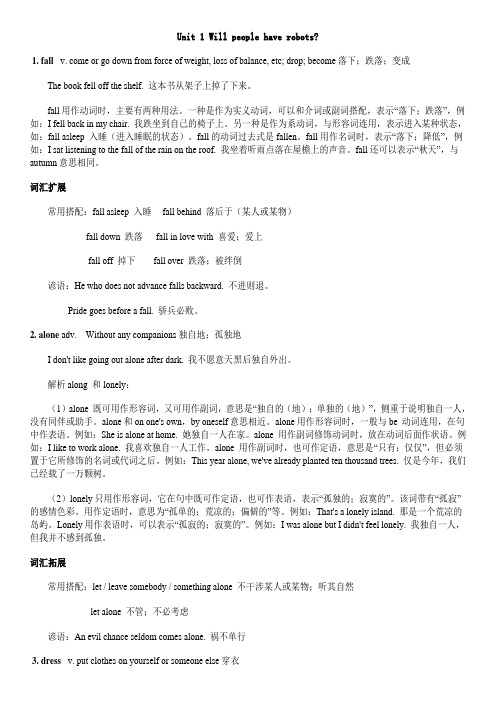
Unit 1 Will people have robots?1. fall v. come or go down from force of weight, loss of balance, etc; drop; become 落下;跌落;变成The book fell off the shelf. 这本书从架子上掉了下来。
fall用作动词时,主要有两种用法。
一种是作为实义动词,可以和介词或副词搭配,表示“落下;跌落”,例如:I fell back in my chair. 我跌坐到自己的椅子上。
另一种是作为系动词,与形容词连用,表示进入某种状态,如:fall asleep 入睡(进入睡眠的状态)。
fall的动词过去式是fallen。
fall用作名词时,表示“落下;降低”,例如:I sat listening to the fall of the rain on the roof. 我坐着听雨点落在屋檐上的声音。
fall还可以表示“秋天”,与autumn意思相同。
词汇扩展常用搭配:fall asleep 入睡fall behind 落后于(某人或某物)fall down 跌落fall in love with 喜爱;爱上fall off 掉下fall over 跌落;被绊倒谚语:He who does not advance falls backward. 不进则退。
Pride goes before a fall. 骄兵必败。
2. alone adv. Without any companions 独自地;孤独地I don't like going out alone after dark. 我不愿意天黑后独自外出。
解析along 和lonely:(1)alone 既可用作形容词,又可用作副词,意思是“独自的(地);单独的(地)”,侧重于说明独自一人,没有同伴或助手。
alone和on one's own,by oneself意思相近。
人教版八年级下册各单元英语语法解析知识重点总结
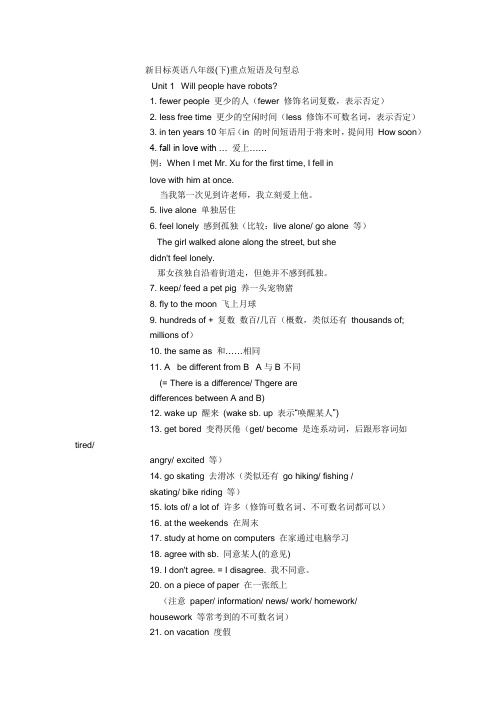
新目标英语八年级(下)重点短语及句型总Unit 1 Will people have robots?1. fewer people 更少的人(fewer 修饰名词复数,表示否定)2. less free time 更少的空闲时间(less 修饰不可数名词,表示否定)3. in ten years 10年后(in 的时间短语用于将来时,提问用How soon)4. fall in love with … 爱上……例:When I met Mr. Xu for the first time, I fell inlove with him at once.当我第一次见到许老师,我立刻爱上他。
5. live alone 单独居住6. feel lonely 感到孤独(比较:live alone/ go alone 等)The girl walked alone along the street, but shedidn't feel lonely.那女孩独自沿着街道走,但她并不感到孤独。
7. keep/ feed a pet pig 养一头宠物猪8. fly to the moon 飞上月球9. hundreds of + 复数数百/几百(概数,类似还有thousands of;millions of)10. the same as 和……相同11. A be different from B A与B不同(= There is a difference/ Thgere aredifferences between A and B)12. wake up 醒来(wake sb. up 表示“唤醒某人”)13. get bored 变得厌倦(get/ become 是连系动词,后跟形容词如tired/angry/ excited 等)14. go skating 去滑冰(类似还有go hiking/ fishing /skating/ bike riding 等)15. lots of/ a lot of 许多(修饰可数名词、不可数名词都可以)16. at the weekends 在周末17. study at home on computers 在家通过电脑学习18. agree with sb. 同意某人(的意见)19. I don't agree. = I disagree. 我不同意。
八年级新目标Unit 1 Will people have robots(知识点和测试题)
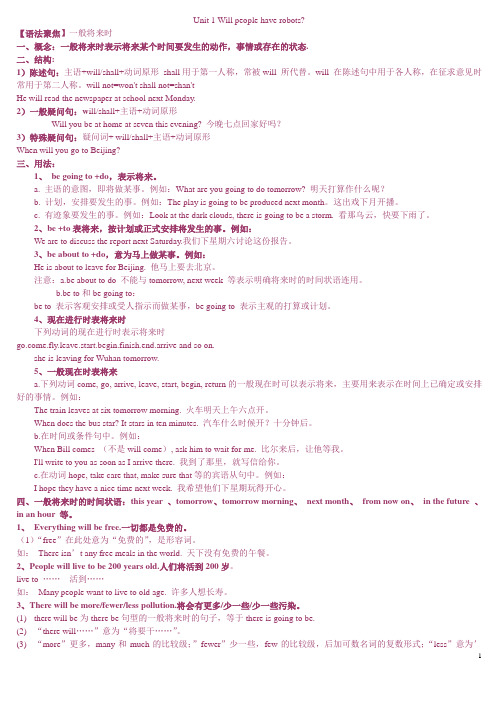
Unit 1 Will people have robots?【语法聚焦】一般将来时一、概念:一般将来时表示将来某个时间要发生的动作,事情或存在的状态.二、结构:1)陈述句:主语+will/shall+动词原形shall用于第一人称,常被will 所代替。
will 在陈述句中用于各人称,在征求意见时常用于第二人称。
will not=won't shall not=shan'tHe will read the newspaper at school next Monday.2)一般疑问句:w ill/shall+主语+动词原形Will you be at home at seven this evening? 今晚七点回家好吗?3)特殊疑问句:疑问词+ will/shall+主语+动词原形When will you go to Beijing?三、用法:1、be going to +do,表示将来。
a. 主语的意图,即将做某事。
例如:What are you going to do tomorrow? 明天打算作什么呢?b. 计划,安排要发生的事。
例如:The play is going to be produced next month。
这出戏下月开播。
c. 有迹象要发生的事。
例如:Look at the dark clouds, there is going to be a storm. 看那乌云,快要下雨了。
2、be +to表将来,按计划或正式安排将发生的事。
例如:We are to discuss the report next Saturday.我们下星期六讨论这份报告。
3、be about to +do,意为马上做某事。
例如:He is about to leave for Beijing. 他马上要去北京。
注意:a.be about to do 不能与tomorrow, next week 等表示明确将来时的时间状语连用。
Unit 1 Will people have robots 重点语法和短语

Unit 1 Will people have robots? 重点语法和短语重点语法:一般将来时态的应用do/does 的一般将来时态形式:(shall/will) dodo/does 的一般将来时态的被动语态:(shall/will) be done 一般将来时态的肯定句、否定句、疑问句形式:肯定句例句:People will have robots in a few years.否定句例句:People (will not/won't) have robots in a few years. 一般疑问句例句:Will people have robots in a few years?特殊疑问句例句:What will people have in a few years?重点短语:won't = will notthey'll = they willshe'll = she willhe'll = he willI'll = I willfall in love with(sb./sth.) 爱上(某人/某物)be able to do sth. 能够做某事come true 实现in the future 未来hundreds of 数以百计的thousands of 数以千计的look for(sb./sth.) 寻找(某人/某物)will → would 情态动词will 的原形和过去式may → might 情态动词may 的原形和过去式Reading Strategy(阅读方法)Look at the title and picture, and predict what you will read about. (看着标题和图片,预知你要阅读那些方面的内容。
)This helps you get ready to acquire new information. (这样可以帮助你获得一些新的信息。
Unit 1 Will people have robots
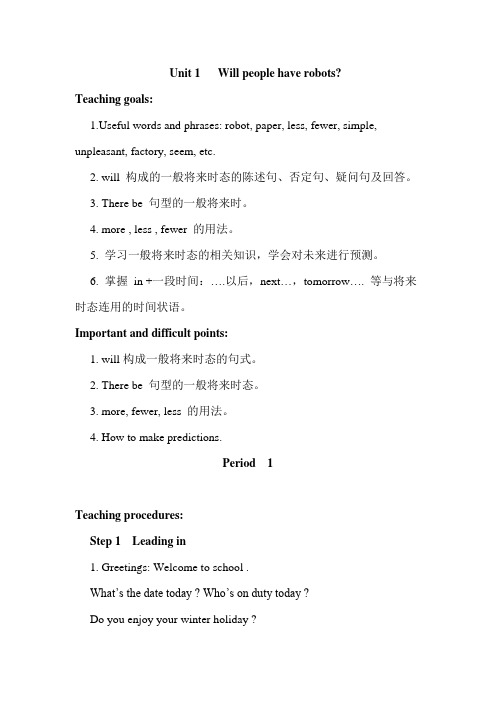
Unit 1 Will people have robots?Teaching goals:eful words and phrases: robot, paper, less, fewer, simple, unpleasant, factory, seem, etc.2. will 构成的一般将来时态的陈述句、否定句、疑问句及回答。
3. There be 句型的一般将来时。
4. more , less , fewer 的用法。
5. 学习一般将来时态的相关知识,学会对未来进行预测。
6. 掌握in +一段时间:….以后,next…,tomorrow…. 等与将来时态连用的时间状语。
Important and difficult points:1. will构成一般将来时态的句式。
2. There be 句型的一般将来时态。
3. more, fewer, less 的用法。
4. How to make predictions.Period 1Teaching procedures:Step 1 Leading in1. Greetings: Welcome to school .What’s the date today ? Who’s on duty today ?Do you enjoy your winter holiday ?Do you finish your homework ?Do you want to live on the moon ?Can you guess what will happen in ten years ?Collect the Ss’ answers and say something about their predictions.Step 2 Pre-taskSB Page 2, 1a.1. Look at the picture: How will the world be different in the future, 100 years from now ?We’re going to talk about sth. in 100 years.2. Read each predictions to the class .Explain the new vocabulary .3. Read the instructions .Make sure Ss know what they should do .4. Do it by themselves.5. Talk about the answers with the class.Explain :一般将来时态构成: will / be going to + 动词原形Step 3 While-taskSB Page 2 ,1b .1. Practise reading the six predictions.2. Read the instructions to Ss. Circle the things you hear on the recording.3. Play the tape twice.4. Play the tape a third time .At the same time, check the answers.SB Page 2 , 1c .1. Pay attention to the dialogues.2. Read the dialogues fluently.3. Pairwork. Work in pairs to make predictions according to the sample.4. Ask several pairs to share their conversations to the class.SB Page 3, 2a & 2b.1. Read the predictions.2. Read the instructions and point out the sample answer.3. Play the tape twice. Ss circle the word they hear in each sentences: more, less , fewer.4. Check the answers.学生探究: less, fewer 的区别。
Unit1Willpeoplehaverobots重点单词

• 7.fall v.落下,跌落 过去式 fell • fall in love with 爱上某人或某物 • fall down 跌倒,失败,倒塌
• 7.alone adv.单独地,孤独地
• 我希望他们今后能更慎重一些。
• 19. Such作形容词,意思是“如此的”“这样 的”,修饰各种名词。
• (1)Such这样的。如It is such bad weather.天气 如此恶劣。
• (2)Such常和as搭配,表示一种类别。如We enjoy such a voice as hers.我们喜欢象她那样的 嗓子。
• That sounds interesting.
• 16.unpleasant adj. 使人不愉快的 • pleasant adj. 使人愉快的 • 17.in the future 未来,将来 • in future今后,从今往后
• The boy wants to become a player in the future.这个男孩想在将来成为一名运动 员。 I hope they'll be more careful in future.
或复数名词被many, few等表示量的形容 词修饰时,用so,不用such. • 20.bored adj.厌烦的,厌倦的 • boring adj.使人厌烦的,使人厌倦的
• I feel bored.
• This lesson is rபைடு நூலகம்ally boring.
• 21.不规则动词 • fly------flew take------took • fall-----fell write-----wrote • make---made come---came • build---built think---thought
willpeoplehaverobots单元教学设计方案

willpeoplehaverobots单元教学设计方案unit 1will people have robots?单元教学设计方案一、教学内容:unit 1 will people have robots? 二、教材及学情分析:本单元围绕“谈论问题” 及“提出建议”这两个话题,设计了相关的语言背景。
section a1a-2c呈现了本单元的重点语法现象一般将来时表示猜测的用法,然后设计了听力活动、结对活动以及小组活动,从听说角度训练了本单元的核心句型,并在grammar focus 中进行了归纳总结。
section a3a-part4 所涉及的活动则先通过与一般过去式和一般现在时的对比,让生进一步了解、掌握一般将来时的结构与用法。
section b1a-2b 先通过词类的分组活动,呈现了听力材料中所要用到的词汇;接着设计了两个听力活动,分别从两个层面,从宏观到细节,帮助学生掌握一般将来时的意义、结构和用法。
2c- part 4 设计的活动,则通过说、读、写的活动,对学生的三种时态的运用能力进行了综合训练,旨在帮助学生形成创造性地运用所学三种时态的能力。
self check 让学生通过活动对自己遣词造句能力及语言综合能力进行了自我评价。
课后所选的阅读材料依然紧扣本单元的语言目标,学习掌握基本的阅读策略,即根据文章标题和相关图片预测文章的大体内容,以获取更多信息的能力,从而让语篇教学成为实现情感态度与价值观目标的有效载体,通过描述未来,调动学生学习积极性,发挥想象力,帮助其树立正确的人生观和价值观:只有付出,才有收获。
八年级上unit 3 what are you doing for vacation? unit 10 i’m going tobe a basketball player. 已经学习了一般将来时,学生已经学会用现在进行时谈论未来的计划,用be going to 句型谈论未来的打算。
斯目标八年级下Unit 1 Will people have robots?难点聚焦

Wi o e f e o r a v nn ? l y u b r n Fi y ee ig l e d Wi epe h v oos l p期 五晚上 有空 吗 ? 人 们将会 有机 器人 吗 ?
2 T e e wi o l b n o nr.将会 只有一个 国家 。 . h r l n e o e c u t l y y T ee wl b 是 tee b h r i e l hr e句型 的一般 将来 时形式 。例 如 :
1wl b 5 n x m nh i e 1 e t o t. l H o ’ b ak b fr 1 . e w n t e b c e e 0 o 下 个月 我就 1 5岁 了 。 十点前他 不会 回来 。
w l移 至句 首 , 成一般 将来 时 的一般 疑问句 。例 如 : i l 构
~
…
~
…
…
辫
… …
丛 坠 黪
辫
新 目标 八 年 级 下 U i Wi t n 1 l l p o l a e r b t? e pe h v o o s 难点聚焦
重 点 词 汇
单 词
wl将 , ;rb t i l 会 o o 机器人 ;p l t n污染 ;fw r 少 的 ;at n u 宇航 员 ;rce 火箭 ;sae o ui l o ee较 soat r ok t p c s t n太 空站 ;m o ti ao o n月亮 , 球 ;sini 科 学 家 ;po a l 月 ce tt s rb b y大概 , 许 ;p s be可 能 的 ;se 或 os l i e m像
f 与 l e w 。 及 m r表示数量的用法。 o e
1 e )fw形 容词 ,几乎 没有 , 少 的” 修 饰可数 名词 。 比较级 、 “ 很 , 其 最高级 为规 则变 化 : w e e- f —fw r_ e fw s。a f e et w表示 “ e 一些 ” f , w带 否定 含义 ,几乎 没有 ” e “ 。例 如 : Heh sfw  ̄ e d ee a e i sh r. n 他在 这里 几乎没 有朋 友 。
Unit1(1)Will people have robots

Will people have robots in their homes ? Will people use money in 100 years ? Yes, they will.
Will books be only on computer ?
Will kids go to school ? Will they study at home ? Will there only be one country ? No, they/ there won’t .
Will people live to be 200 years old ?
in the future
Will people have robots
in people’s homes ?
Yes ,they will. People will have robots in their homes No ,they won’t=will not
in the future
There will only be one country. People will live to be 200 years old.
Will
every
home have a
car?
Yes ,they will They will have a car.
Will these be true in the future?
in the future
robot
People will have robots in their homes.Βιβλιοθήκη in the future
People won’t use money. Everything will be free.
八年级(下)英语《Unit1 Will people have robots》课件2

be used by sb
被某人所使用
1 实现 2 最大的一家电影公司 3 看到演员说话 4 被大多数人所使用 5 哪一个国家将赢得下一届世界杯? 6 明天的天气会怎么样? 7 哪些电影明年会获奖? 8 20年后,青少年会做什么娱乐活动? 1 come true 2 one of the biggest movie companies 3 see actors talk. 4 be used by most people 5 Which country will win the next World Cup? 6 What will the weather be like tomorrow? 7 Which movies will win awards next year? 8 What will teenagers do for fun twenty years from now?
美国一家最大的电影公司的头预测没有人将看到演员说话。
one of +复数 ---之一 see actors talk -see sb do 看到某人做某事 4 He thought that computers would never be used by most people.
他认为计算机不会被大多数人使用.
3. I need to
4. We have to
smart for my job interview.
面试;面谈
a uniform to school.
5. One day people will fly to the moon for va and translate the sentences. 1 Predicting the future can be difficult. 预测未来会很困难。 动名词担当主语 2 There are many famous predictions that never came true.
初中英语《Unit1Willpeoplehaverobots》单元教学设计以及思维导图2
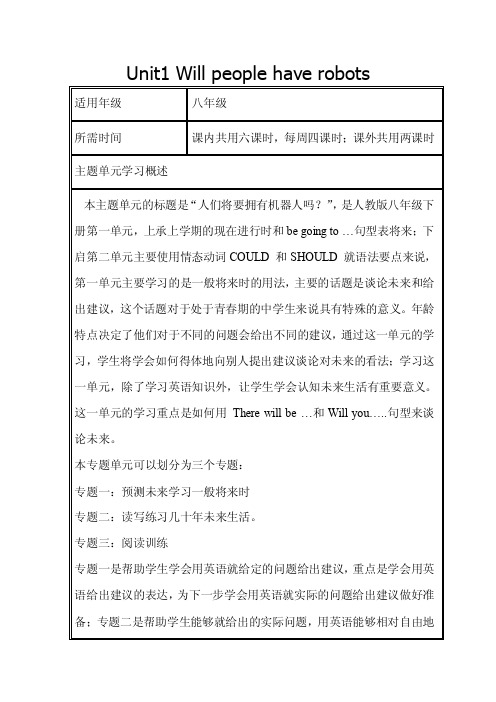
乃至书面给出建议。专题三是研究性学习专题,在以上两个专题学习的 基础上,让学生研究总结利用好一般将来谈论未来。 主要的学习方式:情境学习,问题学习,合作学习,探究学习。 预期的学习成果:学生学会较自由地运用英语谈论未来。 主题单元规划思维导图
主题单元学习目标 语言知识: 1.Master words “robot,pollution...” and the sentences “There will be less pollution.Will there be the...? Yes, there will. No, there won’t.
fiction movies? 2. What can the robots do for people? 2).Read paragraph 2 answer:
Q: 1. How long do some scientists think people will have robots in their homes?
专题三
阅读训练
所需课时
2 课时
专题学习目标
1.Talking about “robots in the future” Using the words and the prases. The words: unpleasant,scientist, however, hundreds of, already, factory, simple, such, everywhere, human, shape , snake, shape, possible, electric, seem, impossible, housework. The prases : the same as, make …do…, to take…, to help do…, to help with… 2.Teaching Ss to learn to guess the new words in the sentence. Consolidating the Simple Future Tense by reading.
八年级下册英语一到三单元的作文例文
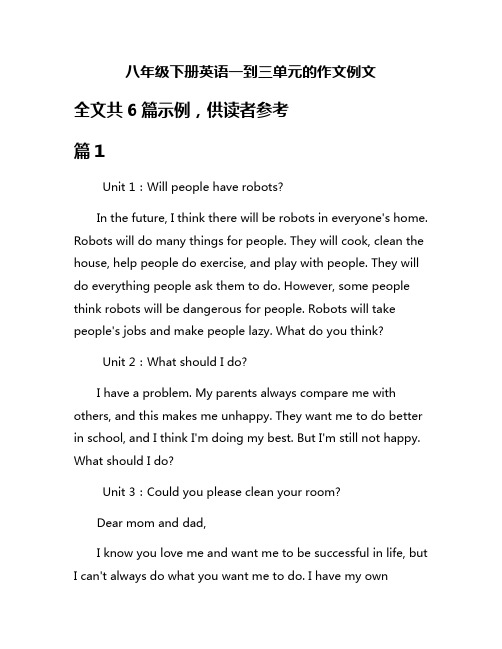
八年级下册英语一到三单元的作文例文全文共6篇示例,供读者参考篇1Unit 1:Will people have robots?In the future, I think there will be robots in everyone's home. Robots will do many things for people. They will cook, clean the house, help people do exercise, and play with people. They will do everything people ask them to do. However, some people think robots will be dangerous for people. Robots will take people's jobs and make people lazy. What do you think?Unit 2:What should I do?I have a problem. My parents always compare me with others, and this makes me unhappy. They want me to do better in school, and I think I'm doing my best. But I'm still not happy. What should I do?Unit 3:Could you please clean your room?Dear mom and dad,I know you love me and want me to be successful in life, but I can't always do what you want me to do. I have my owninterests and hobbies, and I need some free time to do the things I like. I also need to clean and tidy my room and do some chores, but I think it's unfair that I have to do everything by myself. Could you please help me sometimes?Thank you.Sincerely,篇2My name is Li Ming. I am a student in Class 3,Grade 8. I am 14 years old and I am from Beijing.My father is a doctor and my mother is a teacher.I have a sister and a brother. My sister is a student and my brother is a child. I like playing basketball and listening to music. My favorite subject at school is science. I want to be an engineer when I grow up.I love my family and I am proud of them. They are the most important people in my life.篇3My School LifeI am currently studying inand have completed Units 1 to 3 of the English course. In this article, I will write something about my school life and share some of my experiences.In the first unit, we learned about different school clubs and how to participate in them. I joined the English club because I love English and want to improve my speaking skills. In the club, we often have conversations and roleplays in English, which is very helpful for me.In the second unit, we learned about different festivals and celebrations around the world. I learned that different cultures have different ways of celebrating festivals. For example, in China, we usually eat dumplings during the Spring Festival, while in the United States, people usually eat turkey on Thanksgiving.In the third unit, we learned about health and fitness. This unit taught me the importance of keeping healthy, such as eating healthy food, exercising regularly, and getting enough sleep. I try to follow these tips in my daily life and feel much better now.Overall, I have really enjoyed studying these three units and have learned a lot. I hope to learn more interesting things in the future.篇4Unit 1: My Dream SchoolI would like my dream school to be a place that is both fun and challenging. The classrooms would be filled with natural light and there would be lots of green space for us to relax in.I think it's important to have a good variety of lessons, so we could choose the ones we're interested in. For example, we could have classes in cooking, art and music. There would also be a lot of opportunities for us to learn practical skills, like how to fix a bike or build a website.My dream school would also place a strong emphasis on teamwork and cooperation. We would have projects and activities where we work together to solve problems and achieve goals.In conclusion, my dream school would be a place where we can learn, grow and have fun.Unit 2: How to Keep FitTo keep fit, we need to eat a balanced diet and exercise regularly. Eating plenty of fruits, vegetables and whole grains is important, as well as limiting our intake of sugar and saturatedfat. Exercising for at least 30 minutes most days of the week can help us stay healthy and strong. This could include activities like walking, cycling or swimming.It's also important to get enough sleep and manage our stress levels. Staying hydrated by drinking plenty of water is another key to good health.In addition, we should limit our exposure to harmful substances, such as cigarettes and alcohol.Regular checkups with a doctor are important for maintaining good health and catching any potential health problems early.In conclusion, by making small changes to our lifestyles, we can greatly improve our chances of staying healthy and living a long life.Unit 3: Online ShoppingIn conclusion, online shopping has some advantages, such as convenience and a wider choice, but it also has some disadvantages, such as the risk of fraud and the inability to try products before buying. Therefore, it's important to consider both the pros and cons before making a purchase.篇5Dear [],I hope this letter finds you well. I'm writing to tell you about my exciting plans for the summer vacation.As you know, I have always been passionate about art, and this summer, I have signed up for an intensive painting course at the local art studio. I can't wait to learn new techniques and develop my skills under the guidance of professional artists.In addition to painting, I also plan to spend some time reading and exploring different cultures. I have recently finished reading "The Catcher in the Rye" and found it to be a profound and thoughtprovoking novel. I would love to discuss it with you and hear your thoughts on it.Furthermore, I am determined to stay active this summer. I have joined a local sports team and will be participating in various sports activities, such as basketball and swimming. I believe that a healthy body and mind are essential for leading a fulfilling life.Lastly, I would like to visit my grandparents during the vacation. They live in the countryside, and I miss spending time with them and enjoying the peace and tranquility of nature.I hope you have a wonderful summer filled with joy and adventure. Don't forget to stay in touch and let me know how you're doing.Best regards,My unforgettable experienceI still remember the day when I went on a school trip to the countryside. It was a sunny Saturday, and my classmates and I were all excited to embark on this new adventure.We arrived at the countryside early in the morning and were immediately greeted by the fresh air and beautiful scenery. We spent the day participating in various activities, such as farming, fishing, and cooking traditional dishes.One of the highlights of the trip was learning how to make traditional Chinese dumplings. Under the guidance of our teacher, we mixed the flour, kneaded the dough, and cut it into small pieces. Then, we rolled out the dough and filled it with minced meat and vegetables. Although it was a bit challengingat first, we all had a lot of fun and managed to make some delicious dumplings.After lunch, we went on a hike through the mountains. The scenery was breathtaking, and we were able to see some wild animals, such as squirrels and birds. It was an amazing experience to be in nature and appreciate its beauty.In the evening, we gathered around a bonfire and sang songs. We shared stories and laughed together, creating memories that will last a lifetime.Overall, the school trip to the countryside was an unforgettable experience for me. I learned a lot about rural life and traditions, and also made some new friends. It was a great opportunity to step out of our comfort zones and try new things, and I am grateful for the memories that I will cherish forever.How to improve your English speaking skillsEnglish is becoming an increasingly important language in the world, and having good speaking skills is essential for communicating effectively. If you want to improve your English speaking skills, here are some tips to help you get started:1. Pace yourself: Slow down and enunciate clearly when speaking English. This will help you to be understood more easily and will also give you time to think about what you want to say.2. Practice regularly: The more you speak English, the more confident and fluent you will become. Try to speak English as often as possible, whether it's with friends, family, or English language exchange partners.3. Record yourself: By recording yourself speaking English, you can listen to your own pronunciation and intonation and identify areas where you need to improve.4. Read aloud: Reading aloud helps to improve your fluency and pronunciation. Choose something that interests you, such as a novel, magazine, or newspaper, and read it aloud.5. Watch English movies and TV shows: This can help you to improve your listening skills and become more familiar with the rhythm and intonation of English speech.6. Join a conversation class: Taking a conversation class can provide you with structured practice and feedback from a teacher and other students.7. Think in English: Try to use English to describe your thoughts and ideas, even if you're not speaking to anyone. This will help to train your brain to think in English.In conclusion, improving your English speaking skills takes time and effort, but with regular practice and a positive attitude, you can become a more confident and fluent English speaker.篇6My Favorite SportAs an student, I love sports which make me stressedrelieved and talenteddeveloped. Among various sports, my favorite one is basketball.Basketball is not only a sport, but also a way of life. It needs teamwork, skills, tactics, and strategies. It also needs passion, confidence, and perseverance. When I play basketball, I feel the joy of movement, the challenge of competition, and the friendship of cooperation. I learn how to respect my opponents, how to trust my teammates, and how to enjoy the victory.Basketball has changed me a lot. It has made me stronger both physically and mentally. It has given me more confidence and courage. It has also brought me many friends and memories.Basketball is not only my hobby, but also my dream. I hope one day I can become a professional basketball player and represent my country in the world stage.So, that’s my favorite sport. What’s yours?。
初中英语《Unit1Willpeoplehaverobots》单元教学设计以及思维导图
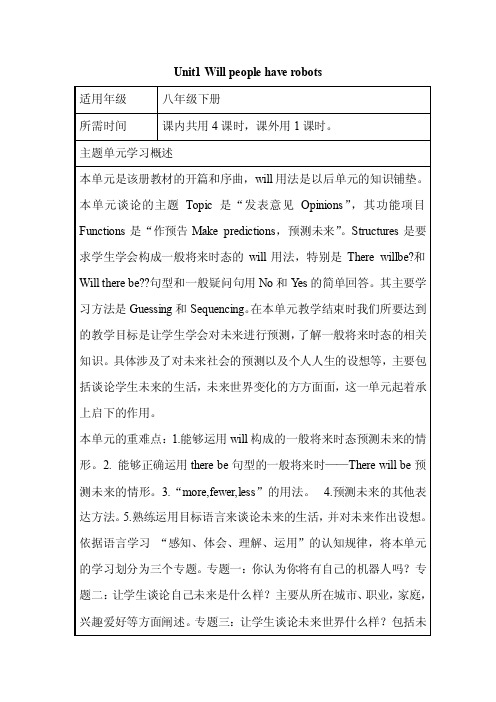
上启下的作用。
本单元的重难点:1.能够运用 will 构成的一般将来时态预测未来的情
形。2. 能够正确运用 there be 句型的一般将来时——There will be 预
测未来的情形。3.“more,fewer,less”的用法。 4.预测未来的其他表 达方法。5.熟练运用目标语言来谈论未来的生活,并对未来作出设想。
对应课标 1.对英语学习表现出积极性和初步的自信心。 2.能听懂有关熟悉话题的谈话,并能从中提取信息和观点。 3.能有效地询问信息和请求帮助。 4.能以小组讨论的方式起草和修改作文。 5.能预测未来,参与简单的角色扮演等活动。 6.能尝试使用适当的学习方法,克服学习中遇到的困难。
1.Do you think you will have your own robot?
评价要点
1.能用适当的语音语调正确朗读本单元中的句型、对 话和短文。 2.根据 3a 阅读语篇任务所建构的篇章结构,学生能 复述 3a 并写一篇关于自己未来生活的文章。。 3.能运用所学句型说出对未来社会的预测以及个人 人生的设想等。 4.能够阅读文章,理解大意,找出相关信息。 5.通过学生自评,学生互评,教师评价等对上述内容 进行评价
主题单元问题 2.What will your life be like in the future?
设计
3.What will the world be like in the future?
专题一:1.Do you think you will have your own robot? ( 2 课时)
专题划分
专题二:2.What will your life be like in the future? ( 1 课时)
Unit-1-Will-people-have-robots知识点总结
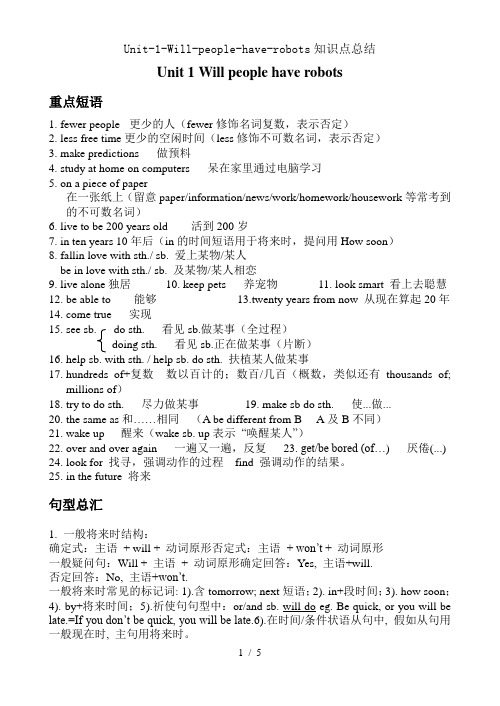
Unit 1 Will people have robots重点短语1. fewer people 更少的人(fewer修饰名词复数,表示否定)2. less free time更少的空闲时间(less修饰不可数名词,表示否定)3. make predictions 做预料4. study at home on computers 呆在家里通过电脑学习5. on a piece of paper在一张纸上(留意paper/information/news/work/homework/housework等常考到的不可数名词)6. live to be 200 years old 活到200岁7. in ten years 10年后(in的时间短语用于将来时,提问用How soon)8. fallin love with sth./ sb. 爱上某物/某人be in love with sth./ sb. 及某物/某人相恋9. live alone独居10. keep pets 养宠物11. look smart 看上去聪慧12.be able to 能够13.twenty years from now 从现在算起20年e true 实现15.see sb. do sth. 看见sb.做某事(全过程)doing sth. 看见sb.正在做某事(片断)16.help sb. with sth. / help sb. do sth. 扶植某人做某事17.hundreds of+复数数以百计的;数百/几百(概数,类似还有thousands of;millions of)18.try to do sth. 尽力做某事19. make sb do sth. 使...做...20.the same as和……相同(A be different from B A及B不同)21.wake up 醒来(wake sb. up表示“唤醒某人”)22.over and over again 一遍又一遍,反复23. get/be bored (of…) 厌倦(...)24.look for 找寻,强调动作的过程find 强调动作的结果。
- 1、下载文档前请自行甄别文档内容的完整性,平台不提供额外的编辑、内容补充、找答案等附加服务。
- 2、"仅部分预览"的文档,不可在线预览部分如存在完整性等问题,可反馈申请退款(可完整预览的文档不适用该条件!)。
- 3、如文档侵犯您的权益,请联系客服反馈,我们会尽快为您处理(人工客服工作时间:9:00-18:30)。
Unit 1 Will people have robots?
一、词义辨析
1、fly ①及物动词:驾驶
例题:I can fly a rocket (火箭)and he can fly a plane.
②不及物动词:飞行,时间飞逝
例题:Time flies!
A kite(风筝)is flying in the sky.
③名词:苍蝇
例题:A fly is on the bread(面包).
2、fall ①动词:落下,跌落,降落
例题:A piece of leave (树叶) is falling down from the tree.
②名词:秋天
例题:I will go to Beijing in fall.
二、易混淆短语识记
1、由fall 构成的短语
fall behind 落在(…的)后面;跟不上
例题:In this exam ,he falls behind others.
fall down 倒下;掉下
例题:The apple tree near the door falls down.
fall into 落入..中
例题:An old woman falls into a hole.
fall off 从…掉下
例题:He falls off the bike and his legs hurt.
2、由come 构成的短语
come from 来自
例题:I come from China.
come over 过来
例题:Come over ,please!
come down 下来
例题:It is dengerous(危险的), come down please!
come back 回来
例题:I will come back home next Monday.
come out 出来,出版
例题:The magazine (杂志)about modern life (现代生活)will be came out 。
3、由famous构成的短语
be famous for 以......而闻名,因......而闻名
例题:Beijing is famous for Tian’anmen Square(天安门广场).
be famous as 作为......而闻名
例题:London is famous as the capital (首都)of England.
三、固定短语搭配
1、be used to doing sth 习惯于干某事
例题:My father is used to woking in the night.
2、keep sb doing sth 让某人一直做某事
例题:We need keep us studying every day.
3、try to do sth 试图做某事,尽量做某事
例题:We should try to learn English well.
try doing sth 尝试着做某事
例题:We should try our best finishing the task(任务).
4、seem to do sth 似乎要做某事;好像要做某事
例题:He seems to go shopping.
四、同意不同式表达
1、花费
It takes sb sometime to do sth 做某事花费某人多长时间
例题:It takes me two months to read the book.
pay for sth 为......付款
例题:You must pay for the lunch today.
sth cost sb some money 什么东西花费了某人多少钱
例题:The car costs my father more than 1 million.
spend ...in doing sth 干什么花了多少钱
例题:I spend 90 dollars on those books.
2、穿
put on 穿上;强调动作
例题:Put on your raincoat ,it’s raining.
be in 穿着,戴着;强调服装颜色
例题:Linda is in red today.
wear 穿着,戴着;强调状态
例题:The girl wears a pink dress sitting under the lemon(柠檬)tree.
dress 给......穿衣服
例题:She is dressing her little girl,they are going to the park.
3、能
can 表示允许,可能,惊讶,怀疑
例题:You can write your name on the blackboard.
Can you speak English?
be able to 表示能够
例题:We are able to see the stars in the night.
4、在...以后
五、可数名词和不可数名词
六、语法冲击
一般将来时
1、句型结构:主+be going to +动词原形+其他
主+will+动词原形+其他。
